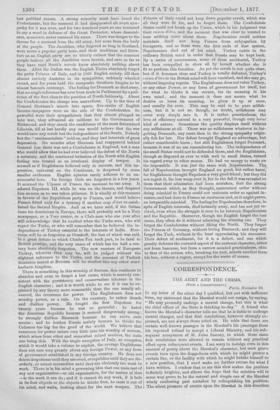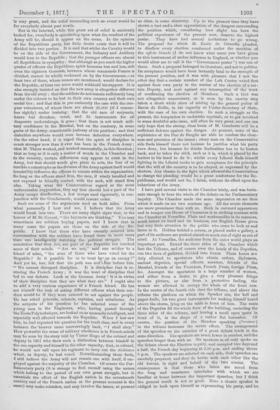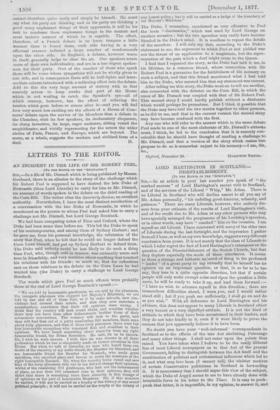CORRESPONDENCE.
THE ARMY AND THE CRISIS.
[FROM A CORRESPONDENT.]
Paris, November 28. IN my letter of the other day / qualified, but not with sufficient force, my statement that the Marshal would not resign, by saying, "He may presently undergo a mental change, but this is what the chief officer of the State is thinking to-day." A friend who knows the Marshal's character tells me that he is liable to undergo mental changes, and that first resolutions, however strongly ex- pressed, are not always those acted on. He adds that there are certain well-known passages in the Marshal's life (amongst them his repeated refusal to accept a Liberal Ministry, and his sub- sequent acceptance of M. Jules Simon), in which these same first resolutions were allowed to remain without any practical effect upon subsequent events. I am sorry to indulge even in this amount of gossip about the Marshal's character, but such grave events turn upon the doggedness with which he might pursue a certain line, or the facility with which he might betake himself to a new position, that I need make no further excuse for what I have written. I confess that to me this view makes the position infinitely brighter, and allows the hope that the solution will in some way prove to be the natural and simple one of the Marshal wisely confessing past mistakes by relinquishing his position. The silent pressure of events upon the Marshal in this direction
is very great, and the relief succeeding such an event would be for everybody almost past words.
But in the interval, while this great act of relief is anxiously looked for, everybody is speculating upon what the conduct of the Army will be should it appear on the scene. In the opinion of the Republican party, but little doubt exists that it will be divided into two parties. It is said that whilst the Cavalry would be on the side of the Government, the infantry and Artillery would lean to the Republic ; that the younger officers are almost all Republican in sympathy ; that although as you reach the higher grades of officers the Republican spirit becomes less and less, still even the eighteen Generals, between whose commands France is divided, cannot be wholly reckoned on by the Government,—at least two of them, whose names are mentioned, would declare for the Republic, at least one more would withhold his support, It is also strongly insisted on that the new army is altogether different from the old army ; that the soldiers do not remain sufficiently long under the colours to be lost to their own country and their own social ties ; and that this is pre-eminently the case with the one- year volunteers, of whom there are about 20,000 (if I remem- ber rightly) under training ; that the old race of serjeants, brave but drunken, venal, and fit instruments for all desperate undertakings, is gone ; that there is not much mili- tary confidence in the Marshal, but on the contrary, in some Farts of the Army, considerable jealousy of hie position ; and that defection anywhere would soon become defection everywhere. On the other hand, it is urged that the spirit of discipline is much stronger now than it over has been in the French Army ; that M. Thiess worked, and worked successfully, in this direction ; that so long as it is only a matter of words in the Chamber and in the country, certain differences may appear to exist in the Army, but that should words give place to acts, the fear of BO 'terrible a catastrophe as the division of the Army against itself would irresistibly influence the officers to remain within the organisation. So long as the officers stand firm, the men, if wisely handled and mot exposed to friendly contact with the mob, will stand firm Also. Taking what the Conservatives regard as the most unfavourable supposition, they say that should but a part of the Army escape disaffection, a few troops used vigorously, in con- junction with the Gendarmerie, would restore order.
Such are some of the arguments used on both sides. From what personally I hear and see, I believe that the Army -would break into two. There are many slight signs that, to the 'horror of M. St. Genest, "the bayonets are thinking." You may Dornetimee see soldiers buying papers, and I know that in -many eases the papers are those on the side of the Re- public. I know that those who have casually entered into 'conversation with the soldiers have found them in more cases -than ODO intelligently watching the political struggle. The *conviction that they, too, are part of the Republic has touched some of their minds. "Are we not," said one soldier to a 'friend of mine, "the sons of those who have voted for the Republic ? Is it possible for us to treat he" as an enemy ?" And yet he, too, felt that his path was not clear before him, 4‘ We cannot disregard discipline. It is discipline that is re- storing the French Army ; it was the want of discipline that 'led to our defeats. Look at the German Army ! it is in virtue of their discipline that they are what they are." I ought also to add a very curious experience of a French friend. He has *set himself the task of asking different officers what their con- duct would be if they were ordered to act against the people. Be has asked generals, colonels, captains, and subalterns. As -the subjects of his question he has selected some of the young men in the Engineers, who, having passed through the EcolePolytechnique, are looked on as unusually intelligent, and especially well affected towards the Republic. When I last saw laim, he had repeated his question for the tenth time, and in every instance the 'answer came unswervingly back, "I shall obey." How powerful the sense of military obedience is in French minds may be seen by the story told by Victor Hugo of the colonel and *deputy in 1851 who drew such a distinction between himself in the one capacity and himself in the other capacity, that, as colonel, be would not call upon his regiment to carry out the cleciAance -which, as deputy, he had voted. Notwithstanding these facts, I still believe the Army will not remain one with itself, if em- ployed against the majority of the Chamber. Of course the Par- liamentary party (it is strange to find oneself using the names which belong to the period of our own great struggle, but in essentials the effort of the English nation in the seventeenth century and of the French nation at the present moment is the same) may make mistakes, and may involve the issues, at present so clear, in some obscurity. Up to the present time they have shown a tact and a clear appreciation of the dangers surrounding the position which, considering how slight has been the political experience of the present men, deserve the highest praise. They have had several invitations to go wrong. The proposal for which M. Emile de Girardin pleaded, to disallow every election conducted under the sanction of the (Side blanche (I do not know what name you have given to this instrument of undue influence in England, or whether you would allow me to call it the "Government poster ") was one of these. Such a proposal belonged to literature, and not to politics. Its acceptance would have been instantly fatal to the strength of the present position, and it was with pleasure that I saw the other day that a certain number of the Left Centre voted first against their own party in the matter of the election of a cer- tain Deputy, and next against any interruption of the work of confirming the election of Members. Such a hint was not altogether unnecessary, as is seen by the unwise step taken a short while since of mixing up the general policy of Baron de Reille, in his capacity as Under-Secretary of State, with the case of his own election. In such a struggle as the present, the temptation to undertake reprisals, or to get involved in some doubtful side-issue, will often be very great, and one can only hope that the strong, clear brain of M. Gambetta will he a sufficient defence against the danger. At present, none of the sophistries of the Due de Broglie are able to confuse the clear- ness and precision of the issues ; every man on the Conservative side finds himself there not because he justifies what his party have done, but because he thinks Radicalism has to be beaten back, and he takes the stick, such as it is, which is placed by the leaders in his hand to do it ; whilst every Liberal finds himself fighting in the Liberal ranks to gain acceptance for the principle that the will of the country is to be obeyed, as expressed by the electors. Any chance in the fight which allowed the Conservatives to change the pleading would be a great misfortune for the Re- publicans, and would not be, I think, without its effect upon the behaviour of the Army.
I have paid several visits to the Chamber lately, and was fortu- nate enough to hear the whole of the debate on the Parliamentary inquiry. The Chamber made the same impression on me then which it made on me two sessions ago. All the scenic elements are more prominent than with us. Both in outward appearance and in temper our House of Commons is in striking contrast with the Chamber at Versailles. Plain and workmanlike in its manners, much intent on itself and its business, our English House gives but very little attention to the public who come to look at and listen to it. Hidden behind a screen, or placed under a gallery, a part of its audience are pushed almost as much out of sight as out of mind. At Versailles, the audience from the outer world plays an important part. Round the three sides of the Chamber which face the Tribune, and of course over the heads of the Deputies, run two tiers of galleries, divided into boxes. These boxes are duly allotted to spectators who obtain orders, diplomats, ancient deputies, special officers, senators, friends of the Marshal, friends of the President, French Press, foreign Press, &c. Amongst the spectators is a large number of women, and either from a desire to give a very pleasant fringe to the picture, or else from a protective feeling, the women are allowed to occupy the whole of the front row. In the centre of the fourth side rises the tribune, and above the tribune the platform on which the Speaker sits, the bell and paper-knife, his two great instruments for making himself heard above the storm, lying on the table in front of him. The seats of the Deputies fill the whole floor of the building, encircling the three sides of the tribune, and leaving a small open space in front of it, in the shape of a rather flat horseshoe. Of course, the position of the Member speaking (l'orateur) in the tribune increases the scenic effect. The arrangement of the speeches on the occasion of a great debate tends in the same direction. The speakers are much fewer in number, and the speeches longer than with us. Six speakers in all only spoke on the debate about the Election inquiry, and occupied two days and a half, the French day beginning at 2.80 p.m. and ending about 6 p.m. The speakers are selected on each side, their speeches are carefully prepared, and they do battle with each other like the old heroes, in sight and behalf of the two armies. The consequence is that those who listen are saved from the long and wearisome interludes with which we are familiar at home between the important speeches, but I think the general result is not so good. Here a chosen speaker is obliged to look upon himself as representing his party, and he cannot therefore quite easily and simply be himself. He must say what his party are thinking, and as his party are thinking a good many unpleasant things of their opponents, it will be his task to condense these unpleasant things in the neatest and most incisive manner of which he is capable. The effect, therefore, of a French debate is to leave tempers a little warmer than it found them, each side having in a very effectual manner inflicted a large number of word-wounds upon the other side. In England, a debate, however warm in itself, generally helps to clear the air. Our speakers retain more of their own individuality, and are in a less degree spokes- men for their party. Out of the number of those who speak there will be some whose sympathies will not be wholly given to one side, and in consequence there will be half-lights and inter- mediate colours introduced with a softening effect into the debate. Add to this the very large amount of oratory with us that scarcely serves to keep awake that part of the House which is not waiting to catch the Speaker's eye—all of which oratory, however, has the effect of relieving the tension which goes before or comes after it—and you will feel how very much less exciting are the effects of a House of Com- mons' debate upon the nerves of its Members than a debate in the Chamber, with its few speakers, its declamatory eloquence, its sharp invective, its large, eager audience, sitting round the amphitheatre, and vividly representing for the actors the wider circles of Paris, France, and Europe, which are beyond. The scene, as a whole, suggests the modern and civilised form of a








































 Previous page
Previous page